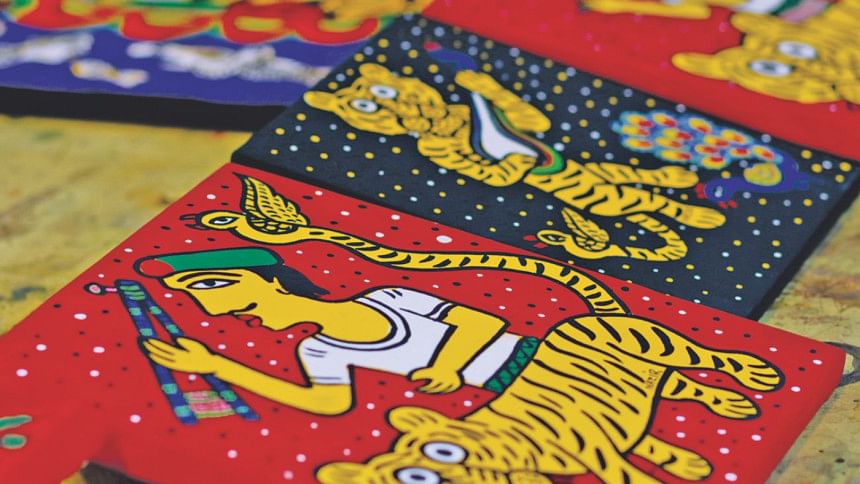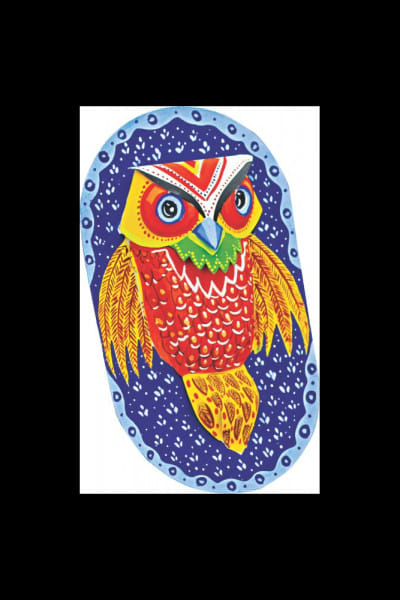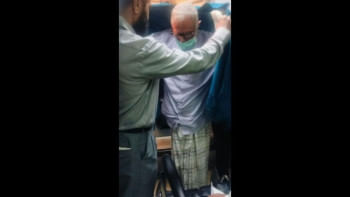NAGORDOLA

I tugged at Dadu's crisp white shirt as he struck up a conversation with Amir Chacha.
"Look how much he's grown since the last time I saw him," Chacha said, and ruffled my hair. The last time I had seen him was a year ago, and even though I had only taken a small leap from age six to seven in the meantime, I felt much older and quite proud of myself. Any other day, I would have liked for them to keep the conversation rolling, but not today.
Time was running out. What if we got to the far end of the courtyard and the nagordola was no longer there? What if we were too late?
The road that led to the only primary school in the tiny village of Dashora had changed quite a lot over the last five years. Yes, it still meandered through the paddy fields that now glared in the scorching sunlight of the new summer but the earthen track had been replaced by a gravel road much easier to drive through. I glanced at the reflection of the people, clad in brightly coloured outfits, making their way to the fair in my rearview mirror and noticed an old man and a boy. The man held the boy's hand and together they trotted towards the fair, talking and laughing. I caught myself smiling at the sight.

Dadu's palms had always fascinated me. His life lines, dark brown against his wheatish skin, crisscrossed like the alleyways of Puran Dhaka, and his fingertips were permanently dented from working as a typist for more than half a century. As we jostled through the sweaty crowd, he held my hand in his calloused grip and I felt relieved thinking I would never be lost as long as he was with me.
Every now and then, he would stop to see a familiar face and have a chat with them, much to my dismay. Right now, he was talking to Moni'r Ma, who sat on her haunches on the ground and churned an overly sweet and shockingly bright pink cotton candy. As she handed me the candy, she smiled and said I took after my mother and if I stuck around a little longer, she would introduce me to Moni. I came to this fair every year on Pahela Baishakh and every year, she said the same thing. It had been seven years, and I still hadn't met Moni.
I made sure Dadu kept walking. I dragged him forward even when he insisted to buy me some toys from the array of stalls set up against the boundary walls of the school building. "All I want is to see the nagordola." I squealed and even amid the chaos, I could hear Dadu's hearty laughter.
I had spent eighteen Pahela Baishakhs in this fair with Dadu. I left my city and my friends and had my parents drive me all the way to the outskirts of Dhaka because this was a holiday reserved solely for him. When I was nineteen, my parents brought him to the city a week prior to the fourteenth of April with a severe case of jaundice.
The first morning of Baishakh saw the two of us in a desolate hospital balcony, him in his wheel chair and I standing next to him with the bag of saline in my hand, looking out at the rally of a thousand Bengalis marching for a peaceful new year. "Look at us celebrate!" he said. His voice was hoarse and weak but his eyes gleamed with tears of joy and pride.
I stood before the majestic ride, awestruck. It sliced through the air in a complete circle, like the second hand of a clock going too fast and creaking after every spin. Every year, it seemed more entrancing than the previous although nothing had changed about it in particular. The people sitting on the benches screamed and laughed, and as I watched them, my heart sank.
"Let him do whatever he wants, Baba, but do not let him ride the nagordola. It's dangerous and I do not wish to lose my son!" My mother's toxic words echoed inside my head and even though Dadu had tried convincing her for the last eight years to at least let me ride it once, she wouldn't listen.
As my eyes welled, Dadu stooped down and wrapped his arm around my shoulders. "It's okay." He said. "I'll buy you a miniature one you can play with all the time." And so he did. A little wooden nagordola found itself next to six identical ones in my showcase back at home.
When I told Dadu I was coming home this April, he was elated. When I told him I was going to spend Pahela Baishakh with him like old times, I could feel him smiling a nearly toothless smile on the other side of the phone. He was in the middle of a conversation with his peers in a tea stall when I called, and I heard him say to them, "My grandson's coming home! He's a grown man now, you'll see!"
It didn't take long to find him once I reached the school's courtyard. His face beamed as he stood, six feet tall in a crisp white shirt, by the gate and as I approached him, he pulled me into a warm embrace. He didn't have to stoop down to hug me anymore.
"Do they still have the nagordola, Dadu?" I asked as we entered the fair.
"Of course they do, at the far end like before! A Baishakhi mela without a nagordola is an absurd thought! " He replied.
"Good to know." I stopped in my tracks and turned to face him.
Dadu looked at me, confused as I smiled, ear to ear, like a child. A moment later, he broke into a feat of laughter and shook his head.
Nobody could stop us from riding the nagordola today.
Shreyosi Endow is a tea addict who likes to read poetry and is obsessed with plants. Send her a mail at [email protected]

 For all latest news, follow The Daily Star's Google News channel.
For all latest news, follow The Daily Star's Google News channel. 



Comments